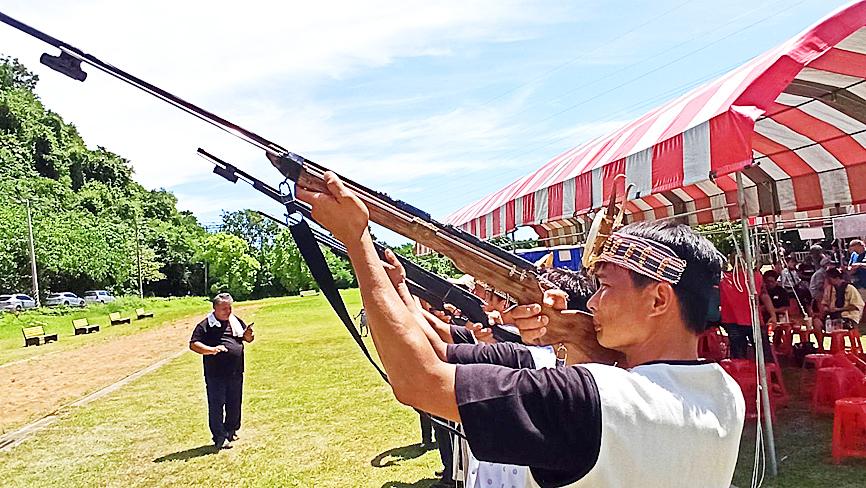Sioulin Township’s (秀林) Truku People’s Hunting Association yesterday awarded 294 hunter certificates to Aborigines of Hualien County, a first step toward self-managed hunting by local Aboriginal villages.
The event might bolster Aborigines’ appeal to the central government to allow more villages to participate in non-commercial hunting, the association said.
After a 2017 project run by the Forestry Bureau’s Hualien Forest District Office helped hunting groups from Tongmen Village (銅門), the groups — from nine townships and 16 villages in Sioulin Township — banded together to form the association.

Photo: Wang Chin-yi, Taipei Times
Yesterday, after overseeing a traditional ceremony of village representatives firing their rifles into the air and lighting smoke bombs, Wenlan Village (文蘭) elder Lowsi Rakaw and association director-general Teyra Yudaw handed out the certificates.
The association follows traditional hunting rules, passes on hunting skills and experience to the next generation, and works with academics and government officials on the sustainability of the natural environment, Yudaw said.
The association’s certificate entails a 20-hour course on topics such as hunting culture, hunter safety, and laws governing hunting and outdoor tracking.
“Our hunters will monitor animal species and regularly patrol the mountains, and we hope to expand our operations into Taroko National Park,” Yudaw said.
Sioulin Township said that it would work with a team led by National Pingtung University of Science and Technology professor Pei Jai-chyi (裴家騏) to set up infrared monitoring and a notation system to record the game hunted by the groups.
District office head Yang Jui-fen (楊瑞芬) said that it would continue to work with the association, and ensure that the nation’s forests and mountains are conserved.
The self-discipline of the Tongmen Village hunting bands has been a key factor in the project’s success and its eventual adoption across Sioulin Township, said National Dong Hwa University environmental studies professor Tai Hsing-sheng (戴興盛), who has been involved in the project for many years.
The event was important for the association and the Truku community, Sioulin Township Mayor Wang Mei-kuei (王玫瑰) said, adding that the township aimed to have Aborigines assist in managing the land.
The Truku community continues to live by their ancestors’ teaching that the “land is our blood, and the mountains and woods our home,” Yudaw said. “We hope to apply conservation methods based on traditional teachings to Taroko National Park and show that the Truku community is once again truly autonomous.”
Yudaw called on the government to honor its pledge of transitional justice for Aborigines and to approve the association’s request that they be allowed to conduct non-commercial hunting on national park land.
“Our ancestors have all hailed from the local mountains and the area is full of materials needed to pass on our cultural,” Yudaw said, lamenting that government policy and environmental protection groups are blocking the Truku community from practicing their culture on traditional land.
“Instead of calling the Taroko National Park a ‘world-renowned scenic hotspot,’ it should instead be known as a large cultural graveyard,” he said.
The knowledge and memories of the Truku community are ebbing away as elders age, Yudaw said, adding that the culture must be passed down so that the community can live how its ancestors lived and believe in Gaya, the teachings and laws set down by the ancestors.

Beijing could eventually see a full amphibious invasion of Taiwan as the only "prudent" way to bring about unification, the US Department of Defense said in a newly released annual report to Congress. The Pentagon's "Annual Report to Congress: Military and Security Developments Involving the People's Republic of China 2025," was in many ways similar to last year’s report but reorganized the analysis of the options China has to take over Taiwan. Generally, according to the report, Chinese leaders view the People's Liberation Army's (PLA) capabilities for a Taiwan campaign as improving, but they remain uncertain about its readiness to successfully seize

HORROR STORIES: One victim recounted not realizing they had been stabbed and seeing people bleeding, while another recalled breaking down in tears after fleeing A man on Friday died after he tried to fight the knife-wielding suspect who went on a stabbing spree near two of Taipei’s busiest metro stations, Taipei Mayor Chiang Wan-an (蔣萬安) said. The 57-year-old man, identified by his family name, Yu (余), encountered the suspect at Exit M7 of Taipei Main Station and immediately tried to stop him, but was fatally wounded and later died, Chiang said, calling the incident “heartbreaking.” Yu’s family would receive at least NT$5 million (US$158,584) in compensation through the Taipei Rapid Transit Corp’s (TRTC) insurance coverage, he said after convening an emergency security response meeting yesterday morning. National

Taiwan has overtaken South Korea this year in per capita income for the first time in 23 years, IMF data showed. Per capita income is a nation’s GDP divided by the total population, used to compare average wealth levels across countries. Taiwan also beat Japan this year on per capita income, after surpassing it for the first time last year, US magazine Newsweek reported yesterday. Across Asia, Taiwan ranked fourth for per capita income at US$37,827 this year due to sustained economic growth, the report said. In the top three spots were Singapore, Macau and Hong Kong, it said. South

Taiwan is getting a day off on Christmas for the first time in 25 years. The change comes after opposition parties passed a law earlier this year to add or restore five public holidays, including Constitution Day, which falls on today, Dec. 25. The day marks the 1947 adoption of the constitution of the Republic of China, as the government in Taipei is formally known. Back then the Chinese Nationalist Party (KMT) governed China from Nanjing. When the KMT, now an opposition party in Taiwan, passed the legislation on holidays, it said that they would help “commemorate the history of national development.” That